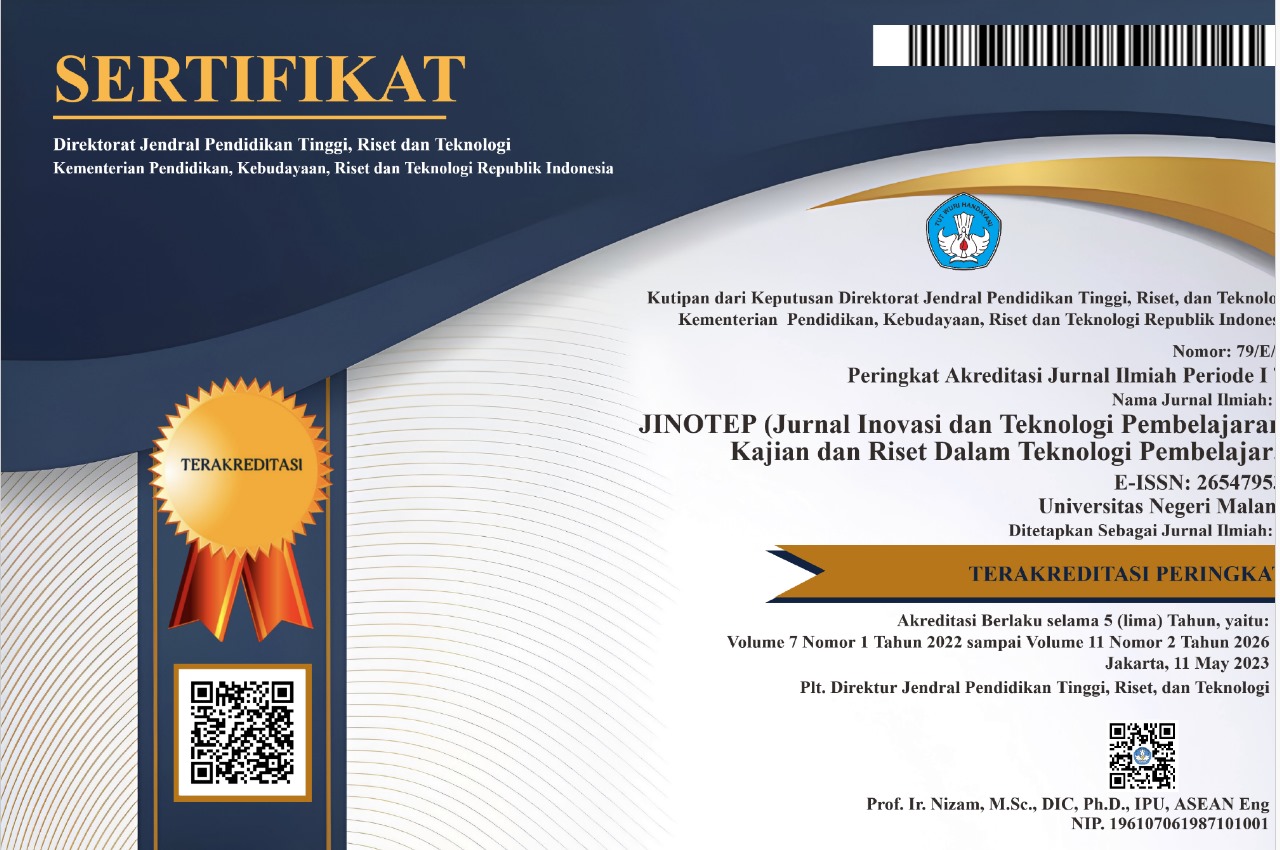Pengembangan E-Book Berbasis Problem Based Learning Pada Pelajaran Bahasa Jawa Kelas IV Sekolah Dasar
Abstract
Abstrak: Penelitian ini bertujuan untuk menghasilkan e-book Bahasa Jawa berbasis Problem Based Learning yang sesuai dengan karakteristik siswa kelas IV yang termasuk generasi Z. Generasi berjuluk generasi intenet ini mustahil menjalani kehidupan tanpa teknologi. Kemajuan teknologi akibat revolusi industri yang terus berkembang menghasilkan tantangan masa depan bagi siswa. Berpikir kritis untuk memecahkan masalah adalah salah satu jalan keluar yang perlu dibiasakan. Oleh karena itu dibutuhkan bahan ajar yang sesuai, yaitu e-book berbasis Problem Based Learning. Penelitian ini adalah penelitian Research and Development (R&D) dengan model pengembangan Dick & Carey. Hasil validasi dari ahli materi terhadap e-book mencapai 92,36% (sangat layak). Hasil ahli desain mencapai 91,67% (sangat layak). Hasil ahli media mencapai 96% (sangat layak). Hasil review guru mencapai 94,22% (sangat layak). Hasil uji coba kelompok kecil mencapai 85,21% (sangat layak) dan hasil uji coba lapangan mencapai 90,51% (sangat layak). Dari hasil data dan analisis penelitian, disimpulkan bahwa pengembangan e-book Bahasa Jawa berbasis Problem Based Learning bagi generasi Z yang membiasakan siswa berpikir kritis berkategori sangat layak dan dapat diterapkan guru dalam pembelajaran.
Abstract: This research aims to produce a Javanese e-book based on Problem Based Learning that is suitable for the characteristics of fourth grade students, including Z generation. This generation nicknamed the internet generation is impossible to live without technology. Technological advances due to the industrial revolution that continues to develop produce future challenges for students. Critical thinking to solve problems is one way out that needs to be accustomed. Therefore, appropriate teaching materials are needed, namely e-book based on Problem Based Learning. This research is a Research and Development (R&D) with Dick & Carey development model. The validation results from material experts on e-books reached 91.67% (very feasible). Media expert results reached 96% (very feasible). The result of the teacher’s review reached 94.22% (very feasible). The results of the small group evaluation reached 85.21% (very feasible). From the results of data and research analysis, it was concluded that the development of a Javanese e-book based on Problem Based Learning for Z generation which familiarizes students to think critically is catagorized as very feasible and can be applied by teachers in learning.
Keywords
Full Text:
PDFReferences
Al-Qassabi, H., & Al-Samarraie, H. (2013). Applying Gagne’s Nine Events in the Design of an Interactive eBook to Learn 3D Animation. Advances in Computing, 2013(3), 60–72. https://doi.org/10.5923/j.ac.20130303.05
Amin, S. (2013). Tinjauan keunggulan dan kelemahan penerapan kurikulum 2013. Al-Bidayah, Vol. 5(Issue 2), 261–279.
Aribowo, E. K. (2018). Digitalisasi Aksara Jawa Dan Pemanfaatannya Sebagai Media Pembelajaran Bagi Musyawarah Guru Mata Pelajaran Bahasa Jawa Smp Kabupaten Klaten. Warta LPM, 21(2), 59–70. https://doi.org/10.23917/warta.v21i2.5620
Asmara, A. P. (2015). Pengembangan Media PemAyu, N. rafika, Arthur, R., & Neolaka, A. (2019). Pengembangan Media Pembelajaran Berbasis Komik Pada Konstruksi Bangunan 1. Jurnal PenSil, 8(1), 40–46. https://doi.org/10.21009/jpensil.v8i1.10628belajaran Berbasis Audio Visual Tenta. Jurnal Ilmiah Didaktika, 15(2), 156–178.
Astuti, D., Siswandari, P., & Santosa, D. (2017). E-Book for Problem Based Learning to Improve Learning Outcome of the Students. 158(Ictte), 220–227. https://doi.org/10.2991/ictte-17.2017.45
Christiani, L. C., & Ikasari, P. N. (2020). Generasi Z dan Pemeliharaan Relasi Antar Generasi dalam Perspektif Budaya Jawa. Jurnal Komunikasi Dan Kajian Media, 4(2), 84–105.
Christianto, J., & Dwiyogo, W. D. (2020). Pengembangan Media Pembelajaran Cricket Berbasis Mobile Learning Pada Tim Olahraga Cricket Universitas Negeri Malang. Gelanggang Pendidikan Jasmani Indonesia, 3(2), 168-174. https://doi.org/10.17977/um040v3i2p168-174
Csobanka, Z. E. (2016). The Z Generation. Acta Technologica Dubnicae, 6(2), 63–76. https://doi.org/10.1515/atd-2016-0012
Dick, W and L. Carey, J. O. Carey. 2005. The systematic Design of Instruction. New York: Logman.
Ernawati, I. (2017). Uji Kelayakan Media Pembelajaran Interaktif Pada Mata Pelajaran Administrasi Server. Elinvo (Electronics, Informatics, and Vocational Education), 2(2), 204–210. https://doi.org/10.21831/elinvo.v2i2.17315
Filivani, P. N., & Agung, A. A. G. (2021). Developing E-Book Contained Character Values in PPKn Lesson Content Grade V Elementary School. Journal of Education Technology, 5(1), 60. https://doi.org/10.23887/jet.v5i1.32047
Fry, A. (2019). Ebook rate of use in OhioLINK: A ten-year study of local and consortial use of publisher packages in Ohio. College and Research Libraries, 80(6), 827–842. https://doi.org/10.5860/crl.80.6.827
Goh, E., & Lee, C. (2018). A workforce to be reckoned with: The emerging pivotal Generation Z hospitality workforce. International Journal of Hospitality Management, 73(October 2017), 20–28. https://doi.org/10.1016/j.ijhm.2018.01.016
Hanafri, M. I., Budiman, A., & Akbar, N. A. (2015). Game Edukasi Tebak Gambar Bahasa Jawa Menggunakan Adobe Flash CS6 Berbasis Android. Jurnal Sisfotek Global, 5(2), 50–53.
Industri, R., Tantangan, D. A. N., & Sosial, P. (2018). Revolusi Industri 4.0 Dan Tantangan Perubahan Sosial. IPTEK Journal of Proceedings Series, 0(5), 22–27. https://doi.org/10.12962/j23546026.y2018i5.4417
Kristiawan, I., Toenlioe, A., & Sulthoni, S. (2018). Penerapan Pembelajaran Problem Solving Pada Mata Pelajaran Pendidikan Kewarganegaraan Untuk Meningkatkan Keterampilan Berfikir Dan Aktivitas Belajar Siswa. JINOTEP (Jurnal Inovasi Dan Teknologi Pembelajaran) Kajian Dan Riset Dalam Teknologi Pembelajaran, 3(1), 62–71. https://doi.org/10.17977/um031v3i12016p062
Lenggono, W. (2019). Peran Media ICT Pada Pembelajaran Al Islam dan Kemuhammadiyahan dan Penggunaanya di SMP Muhammadiyah 1 Purwokerto A . Introduction / Pendahuluan Perkembangan teknologi semakin pesat dan berkembang seiring kehidupan manusia yang semakin komplek ( Elyas , 2. 18(1), 157–178.
Morgan, H. (2013). Multimodal Children’s E-Books Help Young Learners in Reading. Early Childhood Education Journal, 41(6), 477–483. https://doi.org/10.1007/s10643-013-0575-8
Muga, W., Suryono, B., & Januarisca, E. L. (2017). Pengembangan Bahan Ajar Elektronik Berbasis Model Problem Based Learning Dengan Menggunakan Model Dick and Carey. Journal of Education Technology, 1(4), 260. https://doi.org/10.23887/jet.v1i4.12863
Muhammad, M., Rahadian, D., & Safitri, E. R. (2015). Penggunaan Digital Book Berbasis Android Untuk Pada Pelajaran Bahasa Arab. PEDAGOGIA : Jurnal Ilmu Pendidikan, 170–182.
Mulyana. (2008). Pembelajaran Bahasa dan Sastra Daerah Dalam Kerangka Budaya. Jogjakarta: Tiara Wacana.
Mulyani, S., Harti W, S., & Hendri, Z. (2013). Development of Learning Content Model Based on Regional Potentials To Endorse the Learning. Jurnal Kependidikan, 43(1), 51–60.
Nafiah, Y. N., & Suyanto, W. (2014). Penerapan model problem-based learning untuk meningkatkan keterampilan berpikir kritis dan hasil belajar siswa. In Jurnal Pendidikan Vokasi (Vol. 4, Issue 1). https://doi.org/10.21831/jpv.v4i1.2540
Purnomo, H., Santosa, B., & Tentama, F. (2019). Implementation of Problem-Based Learning and Group Investigation (Pbl Go-in) To Improve Vocational Students’ Competence. Journal of Vocational Education Studies, 2(1), 47. https://doi.org/10.12928/joves.v2i1.750
Putri, W. A., Irianto, S., & Wiarsih, C. (2014). The Local Content Analysis of Javanese Material for Fifth Graders of Elementary School. 6(2), 162–178. http://jurnalnasional.ump.ac.id/index.php/Dinamika/article/view/907%0Ahttps://lens.org/132-450-165-370-865
Ramadan, M. Z. (2011). Evaluating college students’ performance of Arabic typeface style, font size, page layout and foreground/background color combinations of e-book materials. In Journal of King Saud University - Engineering Sciences (Vol. 23, Issue 2, pp. 89–100). https://doi.org/10.1016/j.jksues.2011.03.005
Riduwan, 2011. Metode dan Teknik Menyusun Proposal Penelitian. Bandung: Alfabeta.
Salubi, O. G., Ondari-Okemwa, E., & Nekhwevha, F. (2018). Utilisation of library information resources among generation Z students: Facts and fiction. Publications, 6(2), 1–12. https://doi.org/10.3390/publications6020016
Silviarista, M., Setyosari, P., & Sihkabuden, S. (2018). Pengembangan Multimedia Pembelajaran Berbasis Mobile Untuk Mata Pelajaran Bahasa Jawa Materi Aksara Jawa Kelas VIII SMP. JINOTEP (Jurnal Inovasi Dan Teknologi Pembelajaran) Kajian Dan Riset Dalam Teknologi Pembelajaran, 4(1), 22–27. https://doi.org/10.17977/um031v4i12017p022
Tanjung, R. F. (2019). Answering the Challenge of Industrial Revolution 4.0 Through Improved Skills Use of Technology College. International Journal for Educational and Vocational Studies, 1(1), 11. https://doi.org/10.29103/ijevs.v1i1.1374
DOI: http://dx.doi.org/10.17977/um031v8i32021p289
Refbacks
- There are currently no refbacks.
Copyright (c) 2021 Liana Liana, Iskandar Wiryokusumo, Ibut Priono Leksono

This work is licensed under a Creative Commons Attribution-ShareAlike 4.0 International License.
======================================================================
Jurnal Inovasi dan Teknologi Pembelajaran published by Universitas Negeri Malang in collaboration with the Asosiasi Program Studi Teknologi Pendidikan Indonesia (APS TPI) and Ikatan Profesi Teknologi Pendidikan Indonesia (IPTPI) with a MoU.
Publisher Address:
Educational Technology Laboratorium, Building D5, 1st Floor
Faculty of Education, Universitas Negeri Malang
Semarang St. No. 5, Malang City, East Java Province, Postal Code 65145
Email: jinotep.fip@um.ac.id
======================================================================

JINOTEP is licensed under a Creative Commons Attribution-ShareAlike 4.0 International License.
JINOTEP Statistics (Since July 13th, 2020)



.png)




.png)
1.png)
1.png)
4.png)
2.png)
1.png)
1.png)
.png)


_3.png)





1.png)
.png)